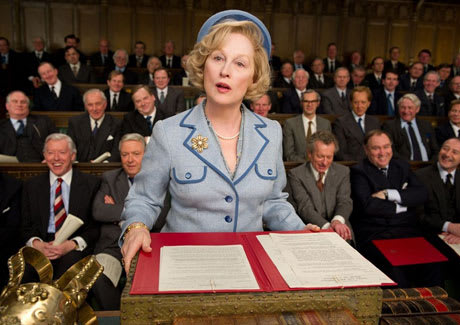If you're looking for a sombre, polished, "realist" biopic, you won't find it here. Director Phyllida Lloyd (Mamma Mia) takes a disjointed and partially imagined approach to this film about Britain's first female prime minister, Margaret Thatcher.
Concentrating largely on Thatcher's later years, in which she hallucinates interactions with her late husband, the film, at least in that respect, is hardly solidly grounded in reality. Still, it's an interesting watch, if only for the fact that a story about a power-hungry, despotic woman with a singular ambition is something of a rarity.
While the present-day scenes are speculative, all of Thatcher's flashbacks to milestones in her political career are based on fact: repeated IRA bombings, the Falklands war and Thatcher's undeniable significance in the shake-up of the boys' club that was British politics are all detailed with precision. Some critics have frowned upon what they perceive to be the "soft" treatment the film takes on a woman whose hard-line conservative policies devastated public services, unions and the poor.
But there is a difference between being "soft" and simply nuanced; The Iron Lady takes the latter approach. If you want to see Thatcher demonized like the anathema of the left she once was, this film won't provide that. It doesn't, however, go easy on Thatcher. Her veiled racist comments, staunch commitment to right-wing philosophies, insufferably parochial sound bites and unwavering inability to compromise are all clearly presented.
There's no question about the excellence of Meryl Streep's performance. But just because the talented actress imbues Thatcher with a significant degree of charm, wit and even humour doesn't mean the movie excuses the political violence of Thatcher's rise to, and fall from, power.
The Iron Lady is even-handed when showing the degree to which both political sides loved and hated Thatcher passionately. A particularly powerful montage of left-wing protesters being beaten by police outside the window of Thatcher's passing car is just one such moment in which the biopic gives credence to what the people thought about Thatcher, as opposed to what she may have thought of herself.
Formally, The Iron Lady is a bit flighty ― over-the-top music accompanies a number of montages (one of which, detailing Thatcher's early rise to power and popularity, depicts a hilarious snippet of Thatcher and Ronald Reagan as a joyful ballroom dancing pair). But you can't say it isn't fun to watch.
In addition to Streep's mesmerizing performance, the sheer presence of a female figure exhibiting such a cutthroat desire to hold power at all costs (including sacrificing her family, parliamentary loyalties and even the military at her disposal) is fascinating.
Forget Napoleon, Robespierre, Hitler or any other power-hungry despot, Thatcher has it all, and she's sharply dressed to boot.
(Alliance)Concentrating largely on Thatcher's later years, in which she hallucinates interactions with her late husband, the film, at least in that respect, is hardly solidly grounded in reality. Still, it's an interesting watch, if only for the fact that a story about a power-hungry, despotic woman with a singular ambition is something of a rarity.
While the present-day scenes are speculative, all of Thatcher's flashbacks to milestones in her political career are based on fact: repeated IRA bombings, the Falklands war and Thatcher's undeniable significance in the shake-up of the boys' club that was British politics are all detailed with precision. Some critics have frowned upon what they perceive to be the "soft" treatment the film takes on a woman whose hard-line conservative policies devastated public services, unions and the poor.
But there is a difference between being "soft" and simply nuanced; The Iron Lady takes the latter approach. If you want to see Thatcher demonized like the anathema of the left she once was, this film won't provide that. It doesn't, however, go easy on Thatcher. Her veiled racist comments, staunch commitment to right-wing philosophies, insufferably parochial sound bites and unwavering inability to compromise are all clearly presented.
There's no question about the excellence of Meryl Streep's performance. But just because the talented actress imbues Thatcher with a significant degree of charm, wit and even humour doesn't mean the movie excuses the political violence of Thatcher's rise to, and fall from, power.
The Iron Lady is even-handed when showing the degree to which both political sides loved and hated Thatcher passionately. A particularly powerful montage of left-wing protesters being beaten by police outside the window of Thatcher's passing car is just one such moment in which the biopic gives credence to what the people thought about Thatcher, as opposed to what she may have thought of herself.
Formally, The Iron Lady is a bit flighty ― over-the-top music accompanies a number of montages (one of which, detailing Thatcher's early rise to power and popularity, depicts a hilarious snippet of Thatcher and Ronald Reagan as a joyful ballroom dancing pair). But you can't say it isn't fun to watch.
In addition to Streep's mesmerizing performance, the sheer presence of a female figure exhibiting such a cutthroat desire to hold power at all costs (including sacrificing her family, parliamentary loyalties and even the military at her disposal) is fascinating.
Forget Napoleon, Robespierre, Hitler or any other power-hungry despot, Thatcher has it all, and she's sharply dressed to boot.
